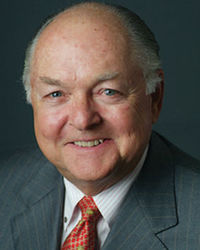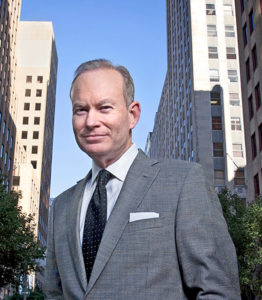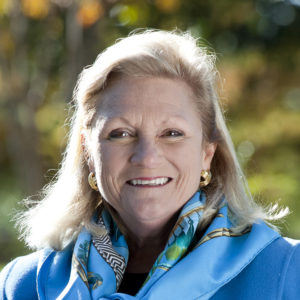9-6-2022
Past, Present & Future of OKC: Mayors David Holt, Ron Norick, Andy Coats, Mick Cornett
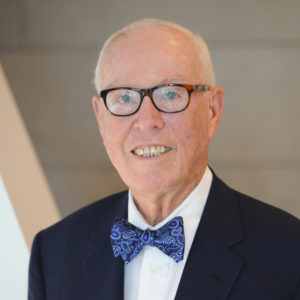 Dates in office: April 12, 1983 – April 14, 1987
Dates in office: April 12, 1983 – April 14, 1987
Andrew Coats, an Oklahoma City native, served as an officer in the U.S. Navy upon completion of his undergraduate degree from the University of Oklahoma. His duties in the Navy included serving as an advisor to the military forces of the Republic of China from 1957 to 1960. Coats returned to Oklahoma in 1960 to attend the University Of Oklahoma.
While in law school, Coats was named the Outstanding Law Student in the State of Oklahoma in 1962 by the Oklahoma Bar Association. The Oklahoma Bar Association also recognized him as the Outstanding Law Graduate in 1963.
Coats was elected Mayor in 1983. During his term, citizen involvement in city government increased with the creation of several advisory committees and task forces. Mayor Coats also fostered improved working relationships between City, County and State governments.
Mayor Coats oversaw many significant improvements to the City’s infrastructure including multiple highway expansions and improvements, as well as much-needed upgrades to the City’s water and sewer systems and to Will Rogers World Airport.
Mayor Coats’ leadership was instrumental in passage of three General Obligation Bond issues and six changes to the City Charter. Mayor Coats was also a key player in the development of the Remington Park horse racing facility which opened in 1988.
Since his term as Mayor, Coats has continued his law career. He serves as Director of the Crowe & Dunlevy law firm and a member of the Board of Directors for IBC Bank. Coats is currently the Dean Emeritus and professor of law at the University of Oklahoma College of Law, in addition to serving as Director Emeritus of the Law Center. He was inducted into the Oklahoma Hall of Fame in 2005.
Dates in office: April 14, 1987 – April 14, 1998
Ronald Norick, son of former mayor James Norick, is the only Oklahoma City mayor to be the son of a former mayor and he is the third mayor to be elected to three consecutive terms.
Mayor Norick worked tirelessly to make Oklahoma City a player on the nation’s economic stage. Under his leadership the City was chosen as a finalist for several large economic developments including a United Airlines maintenance facility. When other cities were chosen for these, Norick focused his efforts on winning passage of the five-year one-cent sales tax to fund the Metropolitan Area Projects (MAPS) program.
City voters approved the MAPS projects and sales tax in December 1993. The money collected was used to build nine sports, recreational, cultural, and convention facilities including the Paycom Center, the Bricktown Canal, and a new downtown library– officially dedicated as the Ronald J. Norick Downtown Library.
The completion of these projects in the ensuing years led to a renaissance of the downtown area and the adjacent Bricktown warehouse district. New hotels, restaurants, and entertainment venues sprang up to cater to locals and tourists alike.
Mayor Norick was an avid proponent of the maintenance and development of the City’s infrastructure, and provided leadership in the passage of General Obligation Bond Issues in 1989 and 1995 totaling over $374 million. The proceeds of these bond issues were used to finance projects included in a capital improvement plan formulated under Mayor Norick’s administration.
During Mayor Norick’s tenure, Oklahoma City was twice named one of the ten best-managed cities in the U.S. by Financial World magazine and one of the ten best cities in which to do business by Fortune magazine.
Oklahoma City was also rated the most affordable city to live in by U.S. News and World Report magazine. The bombing of the Alfred P. Murrah Federal Building on April 19, 1995, was a major blow to the downtown area as the Murrah building was completely destroyed and many of the surrounding buildings suffered extensive damage. Mayor Norick provided strong leadership during the rescue and recovery efforts and was recognized as an eloquent spokesman for the City during this difficult time. He was also involved in the redevelopment of the areas hardest-hit by the bombing and worked to ensure that the forward progress of the downtown area continued.
Before and during his term in office, Mayor Norick was an employee of his family’s business, Norick Brothers, Inc., and was president of the company from 1981 to 1992. He is currently the controlling manager of the Norick Investment Company, LLC.
Mr. Norick is Chairman of the Oklahoma City Downtown TIF Review Committee, Chairman of the Board of Oklahoma State Fair Inc., Vice – Chairman of the Oklahoma Industries Authority, Vice – Chairman of the Alliance for Economic Development of Oklahoma City and Former Chairman of the Board for Oklahoma City University. Mr. Norick was Inducted into The Oklahoma Hall of Fame in 2008.
Dates in Office: March 2, 2004, and served until April 10, 2018
Mick Cornett became Oklahoma City’s 35th mayor on March 2, 2004, and served until April 10, 2018. He was the first mayor in the City’s history to be elected to a fourth term, and at the end of his term was the longest-serving mayor among the 50 largest cities in America.
The son of postal worker and school teacher, Mick Cornett was born and raised in Oklahoma City. From an early age, his parents taught him the value of public service and encouraged him to keep the faith, work hard and dream big. Former Mayor Cornett lead a thriving community that reflects the same principles his parents instilled in him.
He has been honored by various organizations and publications as the top mayor in Oklahoma and the United States – and an international panel selected then-Mayor Cornett as the second-best mayor in the world. Newsweek magazine called him one of the “five most innovative mayors in the United States.” Governing magazine named him national “Public Official of the Year.” Politico placed him on the publication’s Politico 50 list of “thinkers, doers and visionaries transforming American politics in 2015.”
He was President of the U.S. Conference of Mayors from June 2016 to June 2017.
His leadership was instrumental in bringing the NBA to OKC, and he famously put the entire city on a diet to raise awareness on the national issue of obesity. During his time in office, Oklahoma City invested nearly $2 billion in schools and infrastructure dedicated to improve the city’s quality of life. That investment generated nearly $6 billion in private sector investment.
Former Mayor Cornett provided oversight for the completion of MAPS for Kids, one of the nation’s largest, citywide investments in public education. He championed the passage of MAPS 3, which includes a new convention center, a 70-acre downtown park, modern streetcar system, the nation’s most advanced whitewater rafting facility, senior wellness centers, hundreds of miles of new bike trails and sidewalks and a new fairgrounds expo building.
MAPS 3 also raised the bar on civic engagement in OKC, from guidance in the selection of projects to the more than 70 citizens serving on subcommittees responsible for steering the projects toward completion.
Former Mayor Cornett is a popular international speaker on the topics of health and wellness, urban design, placemaking and walkable cities. Nearly 1.5 million people worldwide have viewed his TED TALK on those topics.
He produced, wrote and directed the award-winning documentary, “Oklahoma City: The Boom, The Bust and The Bomb.” The documentary was released to critical acclaim in 2015 and earned top honors at New Jersey’s Golden Door Film Festival.
He earned a degree in journalism at the University of Oklahoma and an MBA from New York University.
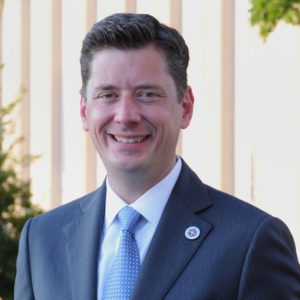 Dates in Office: April 10, 2018 – present
Dates in Office: April 10, 2018 – present
Mayor David Holt became Oklahoma City’s 36th mayor in 2018. He was elected in 2018 with 78.5 percent of the vote, the largest percentage achieved by a non-incumbent since 1947. In 2022, he was re-elected with more votes than any candidate for Mayor since 1959. Holt is the first Native American mayor of Oklahoma City. At the time he took office, Holt was the youngest mayor of Oklahoma City since 1923 and the youngest mayor of a U.S. city with more 500,000 residents.
Mayor Holt’s “One OKC” message reflects his belief that Oklahoma City can continue to thrive only if we set aside the things that divide us and find common purpose
Mayor Holt was born and raised in Oklahoma City. The son of a teacher and a social worker, Mayor Holt has had family in Oklahoma City for the better part of a century. He graduated from Putnam City Public Schools as a National Merit Scholar before receiving his B.A. from George Washington University and his law degree from Oklahoma City University.
Mayor Holt had already served a U.S. House Speaker, a U.S. President, a Lt. Governor and Members of the U.S. House and Senate when he became chief of staff to his predecessor, Mayor Mick Cornett, at age 26. He served five years in that position before being elected to the Oklahoma Senate, where he served almost eight years.
Mayor Holt has quickly emerged as a national leader among mayors. In 2020, he was elected by his peers as a Trustee of the U.S. Conference of Mayors, the highest level of leadership in the organization. He also serves as Vice Chair of the U.S. Conference of Mayors International Affairs Committee. In 2020, he was also elected to the Board of Directors of the National League of Cities (NLC). He is a member of the NLC 2020 Presidential Election Task Force and is co-chair of NLC’s Reimagining Public Safety Task Force. Mayor Holt is also an advisory council member for Accelerator for America, and a member of the 2019-2020 Bloomberg Harvard City Leadership Initiative.
A month after taking office, Mayor Holt was named one of the “Ten Outstanding Young Americans” under the age of 40 by JCI USA (Jaycees). As Mayor, Holt has also received the Visionary Award from the OKC Black Chamber, the Outstanding Civic Leader Award from the Asia Society of Oklahoma, the Shadow & Act Award from the Ralph Ellison Foundation, the Outstanding Elected Official Award from the Oklahoma State Medical Association, the Legacy Award from the Lynn Institute, the Aspire Award from OKC Young Professionals, the Inspiring Hope Award from Upward Transitions, the John A. Reed, Jr. Spirit of the Community Award from Fairview Baptist Missionary Church, the Service Above Self Award from the Rotary Club of Oklahoma City, and the Key Contributor Award from the Oklahoma Academy.
Mayor Holt is also the author of the 2012 book “Big League City: Oklahoma City’s Rise to the NBA,” which chronicles Oklahoma City’s renaissance leading up to that time.
Mayor Holt is a licensed attorney and works for a family-owned investment company in Oklahoma City. He and his wife Rachel, Executive Director of the Oklahoma Office of Juvenile Affairs, have two children, George and Margaret. The Holts are members of St. Augustine of Canterbury Episcopal Church. Mayor Holt is also a member of the Osage Nation.
Chair of the Day
Meg Salyer
A native of Long Island, Meg Salyer has made her home in Oklahoma City for more than 35 years. She is a graduate of Mount Holyoke College, having also completed two years of study abroad at the University of London, the Université Libre de Bruxelles and Franklin University Switzerland.
She began her professional career as a corporate loan officer with the Chase Manhattan Bank in New York. For 25 years, Salyer led Accel Financial Staffing, until the sale of the company to key employees in the 3rd quarter of 2020. She is also principal of Broadway Realty, investing in, and repurposing, historic properties.
Salyer made the decision to take her community service commitment to a new level in November 2008 when she successfully ran for the Ward 6 City Council seat. She served several terms as Vice-Mayor, served as a member of the Oklahoma City Riverfront Redevelopment Authority and was a Mayor’s appointee to the Convention and Visitors Bureau. Salyer served as a member of the Council Finance Committee, Council Economic Development Committee, and as chairman of the Council Social Services Committee. Meg retired from the Council April 8, 2019.
Salyer was inducted into the Oklahoma Woman’s Hall of Fame in 2017 and the Oklahoma Commerce and Industry Hall of Honor in 2020. She served as the first woman president of the Rotary Club of Oklahoma City, (2003/2004), one of the largest Rotary Clubs in the world. She has been recognized by Downtown Oklahoma City with the Dean A. McGee Award and was the 2003 Journal Record Woman of the Year. For more than a decade, Salyer led the team that established the Automobile Alley Main Street Program.
Current Board service includes: Express Services, Inc., First Fidelity Bank, REES Architects, the Oklahoma City Museum of Art, United Way of Central Oklahoma, the Oklahoma School of Science and Math Foundation and i2e (Innovation to Enterprise). Mayor Holt has appointed her to serve on the Oklahoma City Arts Commission. She is a graduate of Leadership Oklahoma, Leadership Oklahoma City, and is a sustaining member of the Junior League of Oklahoma City.

